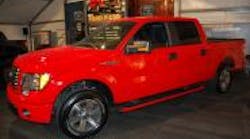“Performance and capability is the story today in this segment. No longer can you deliver one attribute versus another. Pickup owners expect you to deliver them all.” –Doug Scott, truck group marketing manager for Ford Motor Co., during a webcast announcing the fuel economy numbers for engines powering the company’s 2011 F-150 pickup line.
How big a deal is fuel economy in the light-duty pickup segment? A very big deal, according to research conducted by Ford Motor Co. So big a deal, in fact, that its survey findings helped direct its engineering decisions regarding future engine development – engines that deliver some pretty significant fuel economy numbers for this class of vehicle.
Doug Scott, Ford’s truck group marketing manager, noted in a webcast today that the automaker’s research discovered that 70% of the owners in the light-duty pickup segment identified fuel economy as the “number one unmet need” in the marketplace – and that almost HALF of them would be willing to switch pickup truck brands to gain better fuel economy.
Scott, however, also mentioned that those customers wouldn’t switch brands for just small improvements in fuel efficiency, either – they targeted a 20% improvement in mileage as the key “tipping point” for making a change in pickup brands.
Of course, it goes without saying that pickup owners were not about to sacrifice any other features to get that gain in fuel economy. Scott noted that fuel economy, while a much bigger factor in today’s market, only ranks ninth out of the “top 10” list of key attributes a pickup must have, according to Ford’s research. Number one and two, not surprisingly, are quality followed by value/pricing. Towing is number five on the list, with safety as number seven and four-wheel drive as number eight.
Ford, however, thinks it’s cracked the code here with its new lineup of engines – delivering what it believes is plenty of horsepower, torque, towing, and payload capability with fuel economy numbers never seen in the full-sized end of the pickup market.
The 2011 F-150’s base engine is a 3.7-liter four-valve twin independent variable camshaft timing (Ti-VCT) V6 that delivers 16 miles per gallon (mpg) in the city and a projected 23 mpg highway (in the 4x2 configuration). It cranks out 302 horsepower at 6,500 rpm, 278 lb.-ft. of torque at 4,000 rpm, and offers 6,100 lbs of maximum towing capability.
Next is the 5.0-liter four-valve double overhead camshaft (DOHC) Ti-VCT V8 offering 15 mpg city and a projected 21 mpg highway (again in the 4x2 configuration), pending final EPA certification. It cranks out 360 horsepower at 5,500 rpm, 380 lb.-ft. of torque at 4,250 rpm, and offers 10,000 pounds maximum trailer towing capability.
Then there’s the 6.2-liter two-valve single overhead camshaft (SOHC) V8 that offers a projected fuel economy rating of 12 mpg city, 17 mpg highway (again, in the 4x2 configuration), pending final EPA certification. This engine model delivers 411 horsepower at 5,500 rpm, 434 lb.-ft. of torque at 4,500 rpm, and some 11,300 pounds maximum trailer towing capacity.
Ah, but there’s one other engine in the mix – the one Ford is counting on to help it win the fuel economy game. Yet its official numbers are still under wraps apparently. The 3.5-liter Ti-VCT EcoBoost generates 365 horsepower at 5,000 rpm on regular fuel and 420 lb.-ft. of torque at 2,500 rpm on regular fuel, offering 11,300 pounds maximum trailer towing and 3,060 pounds payload capacity.
[Below, Jim Mazuchowski, Ford’s V6 engines program manager, gives an overview of the key technologies within the EcoBoost engine.]
My test drive with an empty-bed 4x2 F-150 crew cab powered with the EcoBoost resulting in 22 mpg mixed city and highway driving. Will the EPA’s tests validate those figures? It’s hard to say. Yet the fuel efficiency numbers EcoBoost officially receives will be that vital metric in Ford’s quest to win more customers. We’ll have to see what happens.



